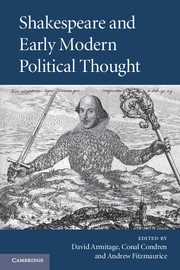Book contents
- Frontmatter
- Contents
- List of contributors
- Acknowledgements
- List of citations and abbreviations
- Introduction
- PART I CONTEXTS
- PART II THE COURT
- 5 Counsel, succession and the politics of Shakespeare's Sonnets
- 6 Educating Hamlet and Prince Hal
- 7 The corruption of Hamlet
- 8 Unfolding ‘the properties of government’: the case of Measure for Measure and the history of political thought
- 9 Shakespeare and the politics of co-authorship: Henry VIII
- PART III THE COMMONWEALTH
- Afterword: Shakespeare and humanist culture
- Index
8 - Unfolding ‘the properties of government’: the case of Measure for Measure and the history of political thought
Published online by Cambridge University Press: 18 January 2010
- Frontmatter
- Contents
- List of contributors
- Acknowledgements
- List of citations and abbreviations
- Introduction
- PART I CONTEXTS
- PART II THE COURT
- 5 Counsel, succession and the politics of Shakespeare's Sonnets
- 6 Educating Hamlet and Prince Hal
- 7 The corruption of Hamlet
- 8 Unfolding ‘the properties of government’: the case of Measure for Measure and the history of political thought
- 9 Shakespeare and the politics of co-authorship: Henry VIII
- PART III THE COMMONWEALTH
- Afterword: Shakespeare and humanist culture
- Index
Summary
Measure for Measure appears to have been a Christmas play for James VI of Scotland, and new king of England, one attracted to staged spectacle. The occasion of its first known performance in 1604 suggests an unusually resonant context: the court, so presumably the audience on that festive occasion, was fluid and confessionally divided with distinct foci of attention, the Queen, Prince Henry and James himself. Prior to the play's performance its suitability would have been vetted by officials and perhaps its text amended, possibly from a staging earlier in the year when the Globe had re-opened after plague. There is no text prior to the Folio, so all this is conjecture, but rushed writing for different occasions might explain the play's elliptical indeterminacy. Yet it is decidedly about political issues of interest to James, and retrospectively it may be seen as bringing Shakespeare and the history of political thought into alignment.
James was a theorist of his own position, something of a philosopherking: a contemplative man of action. Moreover, he was a new prince in a double, even Machiavellian, sense: new to the throne, and a foreigner to boot, with no automatic entitlement of succession, a source of suspicion as well as hope. The suspicions concerned his unfortunate Scottishness, his Roman conception of law and ignorance of England, sources of discomfort hardly allayed since his coronation. By 1604, James was already giving attention to the laws and privileges of London and fretting over legal laxity.
- Type
- Chapter
- Information
- Shakespeare and Early Modern Political Thought , pp. 157 - 175Publisher: Cambridge University PressPrint publication year: 2009
- 3
- Cited by

